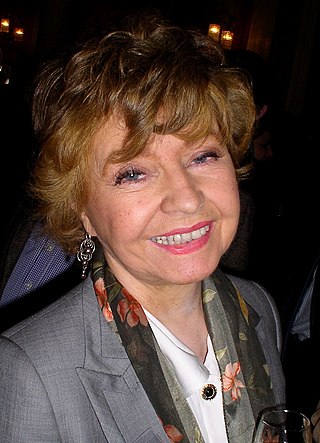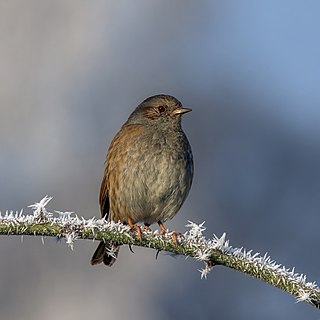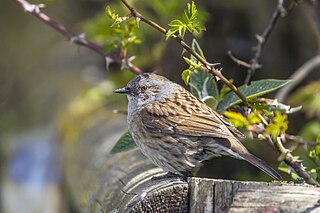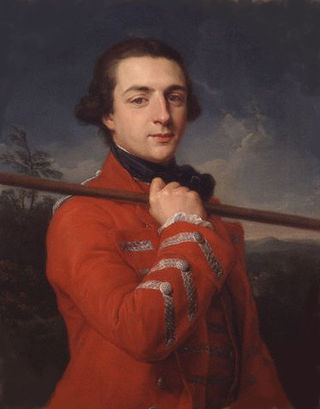
Prunella Margaret Rumney West Scales is a retired English actor. She portrayed Sybil Fawlty, the bossy wife of Basil Fawlty, in the BBC comedy Fawlty Towers, Queen Elizabeth II in A Question of Attribution by Alan Bennett and appeared in the documentary series Great Canal Journeys (2014–2021), travelling on narrowboats with her husband, fellow actor Timothy West.

Timothy Lancaster West, CBE is a retired English actor and presenter. He has appeared frequently on stage and television, including stints in both Coronation Street and EastEnders, and Not Going Out, as the original Geoffrey Adams. He is married to the actress Prunella Scales; from 2014 to 2019, they travelled together on UK and overseas canals in the Channel 4 series Great Canal Journeys.

The accentors are a genus of birds in the family Prunellidae, which is endemic to the Old World. This small group of closely related passerines are all in the genus Prunella. All but the dunnock and the Japanese accentor are inhabitants of the mountainous regions of Europe and Asia; these two also occur in lowland areas, as does the Siberian accentor in the far north of Siberia. These birds are not strongly migratory, but they will leave the coldest parts of their range in winter and make altitudinal movements.

The dunnock is a small passerine, or perching bird, found throughout temperate Europe and into Asian Russia. Dunnocks have also been successfully introduced into New Zealand. It is by far the most widespread member of the accentor family; most other accentors are limited to mountain habitats. Other common names of the dunnock include: hedge accentor, hedge sparrow, hedge warbler, and titling.

The alpine accentor is a small passerine bird in the family Prunellidae, which is native to Eurasia and North Africa.

Prunus spinosa, called blackthorn or sloe, is a species of flowering plant in the rose family Rosaceae. The species is native to Europe, western Asia, and regionally in northwest Africa. It is locally naturalized in New Zealand, Tasmania, and the Pacific Northwest and New England regions of the United States.

Prunella is a genus of herbaceous plants in the family Lamiaceae, also known as self-heals, heal-all, or allheal for their use in herbal medicine.

Gracillariidae is an important family of insects in the order Lepidoptera and the principal family of leaf miners that includes several economic, horticultural or recently invasive pest species such as the horse-chestnut leaf miner, Cameraria ohridella.

Nepticulidae is a family of very small moths with a worldwide distribution. They are characterised by eyecaps over the eyes. These pigmy moths or midget moths, as they are commonly known, include the smallest of all living moths, with a wingspan that can be as little as 3 mm in the case of the European pigmy sorrel moth, but more usually 3.5–10 mm. The wings of adult moths are narrow and lanceolate, sometimes with metallic markings, and with the venation very simplified compared to most other moths.

Prunella Clough was a prominent British artist. She is known mostly for her paintings, though she also made prints and created assemblages of collected objects. She was awarded the Jerwood Prize for painting, and received a retrospective exhibition at Tate Britain.

Prunella vulgaris, the common self-heal, heal-all, woundwort, heart-of-the-earth, carpenter's herb, brownwort or blue curls, is an herbaceous plant in the mint family Lamiaceae.

Cecropterus pylades, the northern cloudywing, is a butterfly species of the family Hesperiidae.
Prunella is a feminine given name. The name is derived from the Latin for plum.

Coleophora albitarsella is a moth of the family Coleophoridae. It is found in most of Europe, but has not been recorded from Ireland and Greece.

Euphyes vestris, the dun skipper, sedge witch or dun sedge skipper, is a species of butterfly of the family Hesperiidae. It is found in North America from Nova Scotia west across southern Canada to southern Alberta, south to Florida, the Gulf Coast and eastern Texas. There are disjunct populations in the High Plains and Rocky Mountains and along the Pacific Coast.

Vernia verna, the little glassywing, is a species of butterfly of the family Hesperiidae. It is found in the eastern United States and southeastern Canada, from central New England west to central Nebraska, south to northern Florida, the Gulf Coast and southern Texas.

Prunella is a 1918 American silent romantic fantasy film directed by Maurice Tourneur. The film is based on the 1906 play Prunella, or, Love in a Dutch Garden by Laurence Housman and Harley Granville-Barker, and stars Marguerite Clark in the title role. Clark also starred in the 1913 Winthrop Ames produced Broadway stage production on which the film is based. The majority of the film is considered lost, with only fragments still in existence.

Prunella was a British Thoroughbred racehorse. Raced from 1791 to 1794, she won three races including a Sweepstakes of 200 guineas each at Newmarket. She was retired to stud and became an influential broodmare, foaling Epsom Derby winner Pope and Epsom Oaks winner Pelisse. Her daughters also went on to become top broodmares in their own right. She was owned by Augustus FitzRoy, 3rd Duke of Grafton.

Mary Bagot Stack, known as Mollie Bagot Stack, founded the Women's League of Health & Beauty in 1930, the first and most significant mass keep-fit system of the 1930s in the UK. This has continued as an exercise system into the 21st century.

















